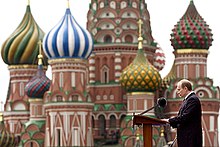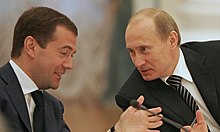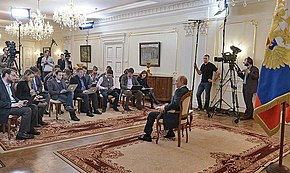google.com
From Wikipedia, the free encyclopedia
Vladimir Vladimirovich Putin (
Russian:
Влади́мир Влади́мирович Пу́тин;
IPA: [vɫɐˈdʲimʲɪr vɫɐˈdʲimʲɪrəvʲɪt͡ɕ ˈputʲɪn] ( listen)
listen), born 7 October 1952) has been the
President of Russia since 7 May 2012. He previously served as President from 2000 to 2008, and as
Prime Minister of Russia from 1999 to 2000 and again from 2008 to 2012. During his last term as Prime Minister, he was also the Chairman of
United Russia, the ruling party.
For 16 years Putin served as an officer in the
KGB, rising to the rank of
Lieutenant Colonel before he retired to enter politics in his native
Saint Petersburg in 1991. He moved to Moscow in 1996 and joined President
Boris Yeltsin's administration where he rose quickly, becoming
Acting President on 31 December 1999 when Yeltsin unexpectedly resigned. Putin won the subsequent
2000 presidential election and was
reelected in 2004. Because of
constitutionally mandated term limits, Putin was ineligible to run for a third consecutive presidential term in 2008.
Dmitry Medvedev won the
2008 presidential election and appointed Putin as
Prime Minister, beginning a period of so-called
"tandemocracy".
[2] In September 2011, following a change in the law extending the presidential term from four years to six,
[3] Putin announced that he would seek a third, non-consecutive term as President in the
2012 presidential election, an announcement which led to
large-scale protests in many Russian cities. He won the election in March 2012 and is serving a six-year term.
[4][5]
Many of Putin's actions are regarded by the domestic opposition and foreign observers as undemocratic.
[6] The 2011
Democracy Index stated that Russia was in "a long process of regression [that] culminated in a move from a hybrid to an
authoritarian regime" in view of Putin's candidacy and flawed parliamentary elections.
[7] In 2014, Russia was excluded from the
G8 group as a result of its
annexation of Crimea.
[8]
During Putin's first premiership and presidency (1999–2008), real
incomes increased by a factor of 2.5, real wages more than tripled;
unemployment and poverty more than halved, and the Russians'
self-assessed life satisfaction rose significantly.
[9] Putin's first presidency was marked by high economic growth: the
Russian economy grew for eight straight years, seeing GDP increase by 72% in
PPP (as for nominal GDP, 600%).
[9][10][11][12][13] As Russia's president, Putin and the
Federal Assembly passed into law a flat
income tax of 13%, a reduced profits tax, and new land and legal codes.
[14][15] As Prime Minister, Putin oversaw large-scale
military and
police reform. His
energy policy has affirmed Russia's position as an
energy superpower.
[citation needed] Putin supported high-tech industries such as the
nuclear and
defence industries. A rise in foreign investment
[16] contributed to a boom in such sectors as the
automotive industry. Putin has cultivated a
strongman image and is a pop cultural icon in Russia with many commercial products named after him.
Ancestry, early life and education

Putin's father, Vladimir Spiridonovich Putin
Putin was born on 7 October 1952, in
Leningrad,
Russian SFSR,
Soviet Union (modern day
Saint Petersburg, Russia),
[17] to parents Vladimir Spiridonovich Putin (1911–1999) and Maria Ivanovna Putina (
née Shelomova; 1911–1998). His mother was a factory worker, and his father was a
conscript in the
Soviet Navy, where he served in the
submarine fleet in the early 1930s, and later served on the front lines in the demolition battalion of the
NKVD during
World War II[18][19][20][21] and was severely wounded in 1942.
[22]
Two elder brothers, Viktor and Albert, were born in the mid-1930s;
Albert died within a few months of birth, while Viktor succumbed to
diphtheria during the
siege of Leningrad
in World War II. Vladimir Putin's paternal grandfather, Spiridon
Ivanovich Putin (1879–1965), was a chef who at one time or another
cooked for
Vladimir Lenin, Lenin's wife
Nadezhda Krupskaya, and on several occasions for
Joseph Stalin.
[23] Putin's maternal grandmother was killed by the German occupiers of
Tver region in 1941, and his maternal uncles disappeared at the war front.
[23]
The ancestry of Vladimir Putin has been described as a mystery with
no records surviving of any ancestors of any people with the surname
"Putin" beyond his grandfather Spiridon Ivanovich. His autobiography,
Ot Pervogo Litsa (English:
In the First Person),
[18] which is based on Putin's interviews, speaks of humble beginnings, including early years in a
communal apartment, shared by several families, in Leningrad. Some researchers speculate that Putin´s ancestry might be linked to
Putyanin clan, "one of the oldest clans in the Russian history" with links to all the royal families of Europe.
[24]

Putin with his mother, Maria Ivanovna, in July 1958
On 1 September 1960, he started at School No. 193 at Baskov Lane,
just across from his house. By 11 years old he was one of a few in a
class of more than 45 pupils who was not yet a member of the
Pioneers, largely because of his rowdy behavior. At 12 years of age he started taking sport seriously in the form of
sambo and then judo. In his youth, Putin was eager to emulate the intelligence officer characters played on the
Soviet screen by actors such as
Vyacheslav Tikhonov and
Georgiy Zhzhonov.
[25]
Putin graduated from the International Law branch of the Law Department of the
Leningrad State University in 1975, writing his final thesis on
international law.
[26] His thesis was titled "The Most Favored Nation Trading Principle in International Law".
[27] While at university he had to join the
Communist Party of the Soviet Union, and remained a member until the party was dissolved in December 1991.
[28] Also at the University he met
Anatoly Sobchak
who later played an important role in Putin's career. Anatoly Sobchak
was at the time an Assistant Professor and lectured Putin's class on
Business Law (khozyaystvennoye pravo).
[29]
KGB career
Putin joined the
KGB
in 1975 upon graduation, and underwent a year's training at the 401st
KGB school in Okhta, Leningrad. He then went on to work briefly in the
Second Chief Directorate (
counter-intelligence) before he was transferred to the
First Chief Directorate, where among his duties was the monitoring of foreigners and consular officials in Leningrad.
[30][31]
From 1985 to 1990, the KGB stationed Putin in
Dresden,
East Germany.
[32]
During that time, Putin was assigned to Directorate S, the illegal
intelligence-gathering unit (the KGB's classification for agents who
used falsified identities) where he was given cover as a translator and
interpreter.
[33] One of Putin's jobs was to coordinate efforts with the
Stasi to track down and recruit foreigners in Dresden, usually those who were enrolled at the
Dresden University of Technology, in the hopes of sending them undercover in the United States. Despite this, Putin biographer
Masha Gessen
disputes the "KGB Spymaster" image that has been built around him and
instead says that Dresden was essentially a backwater job that Putin
himself resented:
Putin and his colleagues were reduced mainly to collecting press
clippings, thus contributing to the mountains of useless information
produced by the KGB. Former agents estimate they spent three-quarters of
their time writing reports. Putin's biggest success in his stay in
Dresden appears to have been in...[contacting] a U.S. Army Sergeant, who
sold them an unclassified Manual for 800 marks.[33]
Following the
collapse of the communist East German government,
Putin was recalled to the Soviet Union and returned to Leningrad, where
in June 1991 he assumed a position with the International Affairs
section of
Leningrad State University, reporting to Vice-Rector
Yuriy Molchanov.
[31]
In his new position, Putin maintained surveillance on the student body
and kept an eye out for recruits. It was during his stint at the
university that Putin grew reacquainted with his former professor
Anatoly Sobchak, then mayor of Leningrad.
[34]
Putin resigned from the active state security services with the rank of
lieutenant colonel on 20 August 1991 (with some attempts to resign made earlier),
[34] on the second day of
the KGB-supported abortive putsch against Soviet President
Mikhail Gorbachev.
[35]
Putin later explained his decision: "As soon as the coup began, I
immediately decided which side I was on", though he also noted that the
choice was hard because he had spent the best part of his life with "the
organs".
[36] In 1999, he described the Soviet Union as "a blind alley, far away from the mainstream of civilization."
[37]
Political career
Saint Petersburg administration (1990–1996)
In May 1990, Putin was appointed as an advisor on international affairs to Mayor
Anatoly Sobchak. Then, on 28 June 1991, he became head of the Committee for External Relations of the
Saint Petersburg Mayor's Office, with responsibility for promoting international relations and foreign investments.
[38] That Committee headed by Putin also registered business ventures.
Less than one year later, Putin was investigated by the city
legislative council, and the investigators concluded that Putin had
understated prices and permitted the export of metals valued at $93
million, in exchange for foreign food aid that never arrived.
[39][40]
Despite the investigators' recommendation that Putin be fired, Putin
remained head of the Committee for External Relations until 1996.
[41][42] From 1994 to 1996, Putin held several other political and governmental positions in
Saint Petersburg.
[43][43]
Early Moscow career (1996–1999)

Putin as
FSB director, 1 January 1998
In 1996, Mayor Anatoly Sobchak lost his bid for reelection in Saint
Petersburg. Putin was called to Moscow and in June 1996 became a Deputy
Chief of the
Presidential Property Management Department (other languages) headed by
Pavel Borodin.
He occupied this position until March 1997. During his tenure Putin was
responsible for the foreign property of the state and organized
transfer of the former assets of the Soviet Union and
Communist Party to the Russian Federation.
[29]
On 26 March 1997, President
Boris Yeltsin appointed Putin deputy chief of
Presidential Staff,
which he remained until May 1998, and chief of the Main Control
Directorate of the Presidential Property Management Department (until
June 1998). His predecessor on this position was
Alexei Kudrin and the successor was
Nikolai Patrushev, both future prominent politicians and Putin's associates.
[29]
On 27 June 1997, at the
Saint Petersburg Mining Institute, guided by rector
Vladimir Litvinenko, Putin defended his
Candidate of Science dissertation in economics, titled "The Strategic Planning of Regional Resources Under the Formation of Market Relations".
[44] This exemplified the custom in Russia for a rising young official to write a scholarly work in midcareer.
[45] When Putin later became president, the dissertation became a target of
plagiarism accusations by fellows at the
Brookings Institution; though the allegedly plagiarised study was referenced,
[46][47] the Brookings fellows felt sure it constituted plagiarism albeit perhaps not "intentional".
[46] The dissertation committee denied the accusations.
[47][48]
On 25 May 1998, Putin was appointed First Deputy Chief of
Presidential Staff for regions, replacing
Viktoriya Mitina; and, on 15 July, was appointed Head of the Commission for the preparation of agreements on the
delimitation of power of regions and the federal center attached to the President, replacing
Sergey Shakhray.
After Putin's appointment, the commission completed no such agreements,
although during Shakhray's term as the Head of the Commission there
were 46 agreements signed.
[49] Later, after becoming president, Putin canceled all those agreements.
[29]
On 25 July 1998, Yeltsin appointed Vladimir Putin head of the
FSB (one of the successor agencies to the KGB), the position Putin occupied until August 1999. He became a permanent member of the
Security Council of the Russian Federation on 1 October 1998 and its Secretary on 29 March 1999.
First Premiership (1999)
On 9 August 1999, Vladimir Putin was appointed one of three First
Deputy Prime Ministers, and later on that day was appointed acting Prime
Minister of the Government of the Russian Federation by President
Boris Yeltsin.
[50]
Yeltsin also announced that he wanted to see Putin as his successor.
Still later on that same day, Putin agreed to run for the presidency.
[51]
On 16 August, the
State Duma approved his appointment as Prime Minister with 233 votes in favour (vs. 84 against, 17 abstained),
[52]
while a simple majority of 226 was required, making him Russia's fifth
PM in fewer than eighteen months. On his appointment, few expected
Putin, virtually unknown to the general public, to last any longer than
his predecessors. He was initially regarded as a Yeltsin loyalist; like
other prime ministers of Boris Yeltsin, Putin did not choose ministers
himself, his cabinet being determined by the presidential
administration.
[53]
Yeltsin's main opponents and would-be successors were already
campaigning to replace the ailing president, and they fought hard to
prevent Putin's emergence as a potential successor. Putin's
law-and-order image and his unrelenting approach to the
Second Chechen War, soon combined to raise Putin's popularity and allowed him to overtake all rivals.
While not formally associated with any party, Putin pledged his support to the newly formed
Unity Party,
[54] which won the second largest percentage of the popular vote (23.3%) in the December 1999
Duma elections, and in turn he was supported by it.
Acting Presidency (1999–2000)
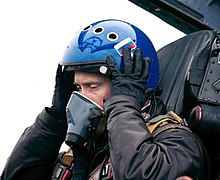
Putin landing in Grozny in a
Su-27 fighter jet, 20 March 2000
On 31 December 1999, Yeltsin unexpectedly resigned and, according to the
Constitution of Russia, Putin became
Acting President of the Russian Federation. On assuming this role, Putin went on a previously scheduled visit to Russian troops in Chechnya.
[citation needed]
The first
Presidential Decree
that Putin signed, on 31 December 1999, was titled "On guarantees for
former president of the Russian Federation and members of his family".
[55][56] This ensured that "corruption charges against the outgoing President and his relatives" would not be pursued.
[57] Later, on 12 February 2001, Putin signed a similar
federal law which replaced the
decree of 1999.
While his opponents had been preparing for an election in June 2000, Yeltsin's resignation resulted in the
Presidential elections being held within three months, on 26 March 2000; Putin won in the first round with 53% of the vote.
[58]
First Presidential term (2000–2004)
The first major challenge to Putin's popularity came in August 2000, when he was criticized for his alleged mishandling of the
Kursk submarine disaster.
[59]
That criticism was largely because it was several days before he
returned from vacation, and several more before he visited the scene.
[59]
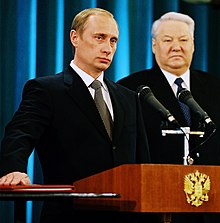
Taking presidential oath beside
Yeltsin, May 2000
Vladimir Putin was inaugurated president on 7 May 2000. He appointed
Minister of Finance Mikhail Kasyanov as his Prime minister.
Between 2000 and 2004, Putin set about reconstruction of the
impoverished condition of the country, apparently winning a
power-struggle with the
Russian oligarchs,
reaching a 'grand-bargain' with them. This bargain allowed the
oligarchs to maintain most of their powers, in exchange for their
explicit support – and alignment with – his government.
[60][61] A new
group of business magnates, such as
Gennady Timchenko,
Vladimir Yakunin,
Yury Kovalchuk,
Sergey Chemezov, with close personal ties to Putin, also emerged.
Many in the Russian press and in the international media warned that
the death of some 130 hostages in the special forces' rescue operation
during the 2002
Moscow theater hostage crisis
would severely damage President Putin's popularity. However, shortly
after the siege had ended, the Russian president was enjoying record
public approval ratings – 83% of Russians declared themselves satisfied
with Putin and his handling of the siege.
[62]
A few months before elections, Putin fired Prime Minister Kasyanov's cabinet and appointed
Mikhail Fradkov to his place.
Sergey Ivanov became the first civilian in Russia to take the Defense Minister position.
In 2003, a referendum was held in Chechnya adopting a new
constitution which declares the Republic as a part of Russia. Chechnya
has been gradually stabilized with the establishment of the
parliamentary elections and a regional government.
[63][64]
Throughout the
war,
Russia severely disabled the Chechen rebel movement. However, sporadic
violence continued to occur throughout the North Caucasus.
[65]
Second Presidential term (2004–2008)
On 14 March 2004,
Putin was elected to the presidency for a second term, receiving 71% of the vote.
[58] The
Beslan school hostage crisis took place in September 2004, in which hundreds died. In response, Putin took a variety of administrative measures.
In 2005, the
National Priority Projects were launched to improve Russia's
health care,
education,
housing and
agriculture.
[66][67]
The continued criminal prosecution of Russia's then richest man, President of
YUKOS company
Mikhail Khodorkovsky, for fraud and
tax evasion
was seen by the international press as a retaliation for Khodorkovsky's
donations to both liberal and communist opponents of the Kremlin. The
government said that Khodorkovsky was corrupting a large segment of the
Duma to prevent tax code changes such as taxes on windfall profits and
closing
offshore tax evasion vehicles.
Khodorkovsky was arrested, Yukos was bankrupted and the company's
assets were auctioned at below-market value, with the largest share
acquired by the state company
Rosneft.
[68] The fate of Yukos was seen in the West as a sign of a broader shift of Russia towards a system of
state capitalism.
[69][70] This was underscored in July 2014 when shareholders of Yukos were awarded $50 billion in compensation by the
Permanent Arbitration Court in
The Hague.
[71]
A study by
Bank of Finland's Institute for Economies in Transition (BOFIT) in 2008 found that state intervention had made a positive impact on the
corporate governance of many companies in Russia: the governance was better in companies with state control or with a stake held by the government.
[72]
Putin was criticized in the West and also by Russian liberals for what many observers considered a wide-scale crackdown on
media freedom in Russia. On 7 October 2006,
Anna Politkovskaya, a journalist who exposed corruption in the
Russian army and its conduct in
Chechnya,
was shot in the lobby of her apartment building. The death of
Politkovskaya triggered an outcry in Western media, with accusations
that, at best, Putin has failed to protect the country's new independent
media.
[73][74] When asked about the Politkovskaya murder in his interview with the German TV channel
ARD, Putin said that her murder brings much more harm to the Russian authorities than her writing.
[75] By 2012 the performers of the murder were arrested and named
Boris Berezovsky and
Akhmed Zakayev as possible clients.
[76]
In 2007, "
Dissenters' Marches" were organized by the opposition group
The Other Russia,
[77] led by former chess champion
Garry Kasparov and national-Bolshevist leader
Eduard Limonov.
Following prior warnings, demonstrations in several Russian cities were
met by police action, which included interfering with the travel of the
protesters and the arrests of as many as 150 people who attempted to
break through police lines.
[78] The Dissenters' Marches have received little support among the Russian general public, according to polls.
[79]
On 12 September 2007, Putin dissolved the government upon the request of Prime Minister
Mikhail Fradkov. Fradkov commented that it was to give the President a "free hand" in the run-up to the parliamentary election.
Viktor Zubkov was appointed the new prime minister.
[80]
In December 2007,
United Russia won 64.24% of the popular vote in their run for
State Duma according to election preliminary results.
[81]
United Russia's victory in December 2007 elections was seen by many as
an indication of strong popular support of the then Russian leadership
and its policies.
[82][83]
In his last days in office Putin was reported to have taken a series
of steps to re-align the regional bureaucracy to make the governors
report to the prime minister rather than the president.
[84][85]
Putin's office explained that "the changes... bear a refining nature
and do not affect the essential positions of the system. The key role in
estimating the effectiveness of activity of regional authority still
belongs to the President of the Russian Federation."
Second Premiership (2008–2012)
Putin was barred from a third term by the Constitution. First Deputy Prime Minister
Dmitry Medvedev was elected his successor. On 8 May 2008, only a day after handing the presidency to Medvedev, Putin was appointed
Prime Minister of Russia, maintaining his political dominance.
[86]
The
Great Recession hit the Russian economy
especially hard,
interrupting the flow of cheap Western credit and investments. This
coincided with tension in relationships with the EU and the US following
the
2008 South Ossetia war, in which Russia defeated
NATO ally
Georgia.
However, the large financial reserves, accumulated in the
Stabilization Fund of Russia
in the previous period of high oil prices, alongside the strong
management helped the country to cope with the crisis and resume
economic growth since mid-2009. The Russian government's anti-crisis
measures have been praised by the
World Bank,
which said in its Russia Economic Report from November 2008: "prudent
fiscal management and substantial financial reserves have protected
Russia from deeper consequences of this external shock. The government's
policy response so far—swift, comprehensive, and coordinated—has helped
limit the impact."
[87]
Putin has named the overcoming of consequences of the world economic
crisis one of the two main achievements of his 2nd Premiership.
[67] The other named achievement was the
stabilisation of the size of Russia's population between 2008–2011 following the long period of demographic collapse started in the 1990s.
[67]
At the
United Russia
Congress in Moscow on 24 September 2011, Medvedev officially proposed
that Putin stand for the Presidency in 2012, an offer which Putin
accepted. Given United Russia's near-total dominance of Russian
politics, many observers believed that Putin was all but assured of a
third term. The move was expected to see Medvedev stand on the United
Russia ticket in the parliamentary elections in December, with a goal of
becoming Prime Minister at the end of his presidential term.
[88] During the
2012 presidential campaign, Putin published 7 articles to present his vision for the future.
[89]
After the
parliamentary elections on 4 December 2011, tens of thousands Russians engaged in
protests against alleged electoral fraud, the largest protests in Putin's time; protesters criticized Putin and
United Russia and demanded annulment of the election results.
[90] However, those protests, organized by the leaders of the Russian "non-systemic opposition", sparked the fear of a
colour revolution in society, and a number of "anti-Orange" counter-protests (the name alludes to the
Orange Revolution in Ukraine) and rallies of Putin supporters were carried out, surpassing in scale the opposition protests.
[91][92][93]
Third Presidential term (2012–present)

Putin taking the presidential oath at his 3rd inauguration ceremony, 7 May 2012
On 4 March 2012, Putin won the
2012 Russian presidential elections in the first round, with 63.6% of the vote.
[58] While efforts to make the elections transparent were publicized, including the usage of
webcams in polling stations, the vote was criticized by the Russian opposition and by international observers from the
Organization for Security and Co-operation in Europe for procedural irregularities.
[94]
Anti-Putin protests took place during and directly after the presidential campaign. The most notorious protest was the
Pussy Riot performance on 21 February, and subsequent trial.
[95] Also, an estimated 8,000–20,000 protesters gathered in Moscow on 6 May,
[96][97] when eighty people were injured in confrontations with police,
[98] and 450 were arrested, with another 120 arrests taking place the following day.
[99]
Putin's presidency was
inaugurated in the
Kremlin on 7 May 2012.
[100] On his first day as President, Putin issued 14
Presidential decrees, which are sometimes called the "May Decrees" by the media, including a lengthy one stating wide-ranging goals for the
Russian economy. Other decrees concerned
education, housing, skilled labor training,
relations with the European Union, the
defense industry, inter-ethnic relations, and other policy areas dealt with in Putin's program articles issued during the presidential campaign.
[101][102]
In 2012 and 2013, Putin and the United Russia party backed stricter legislation against the
LGBT community, in
Saint Petersburg,
Archangelsk and
Novosibirsk; a law against "homosexual propaganda" (which prohibits such symbols as the
rainbow flag as well as published works containing homosexual content) was adopted by the
State Duma in June 2013.
[103][104][105][106][107]
Responding to international concerns about Russia's legislation, Putin
asked critics to note that the law was a "ban on the propaganda of
pedophilia and homosexuality" and he stated that homosexual visitors to
the
2014 Winter Olympics
should "leave the children in peace" but denied there was any
"professional, career or social discrimination" against homosexuals in
Russia.
[108] He publicly hugged openly bisexual ice-skater
Ireen Wust during the games.
[109]
Also in June 2013, Putin attended a televised rally of the
All-Russia People's Front where he was elected head of the movement,
[110] which was set up in 2011.
[111] According to journalist
Steve Rosenberg,
the movement is intended to "reconnect the Kremlin to the Russian
people" and one day, if necessary, replace the increasingly unpopular
United Russia party that currently backs Putin.
[112]
Intervention in Ukraine and annexation of Crimea
In the wake of the
2014 Ukrainian revolution, exiled Ukrainian President
Viktor Yanukovych
put into writing his request that Putin initiate Russia's use of
military forces "to establish legitimacy, peace, law and order,
stability and defending the people of Ukraine".
[113]
On the same day, Putin requested and received authorization from the
Russian Parliament to deploy Russian troops to Ukraine in response to
the crisis.
[114] Russian troops accordingly
mobilized throughout Crimea and the southeast of Ukraine. By 2 March, Russian troops had complete control over Crimea.
[115][116][117] On 16 March 2014,
The New York Times
reported the results of a Crimean referendum: " an overwhelming
majority of Crimeans voted on Sunday to secede from Ukraine and join
Russia…forcing the United States and its European allies to decide how
swiftly and forcefully to levy threatened sanctions against Russian
officials including top aides to President Vladimir V. Putin."
[118]
Subsequently, unrest increased in eastern Ukraine apart from Crimea. On 17 April 2014,
The Wall Street Journal reported:
[119]
"Russian President Vladimir Putin said Thursday he hoped not to send
Russian troops into Ukraine but didn't rule it out, accusing the Kiev
government of committing 'a serious crime' by using the military to
quell unrest. Ukrainian and Russian diplomats, backed by the U.S. and
Europe, agreed to take steps to turn down the heat in the escalating
standoff with pro-Russian militias, even as President Vladimir Putin
showed no sign of backing down.”
[119] The New York Times added that Putin has said that he reserves the right to use armed force to protect ethnic Russians in "
Novorossiya".
[120]
On 7 May 2014,
The New York Times reported: "Putin Announces
Pullback from Ukraine Border" after discussions with Switzerland's
Dieter Burkhalter in an attempt to de-escalate mounting tensions of
Russian troop massing on the border of southeast Ukraine during and
following the Crimean intervention.
[121]
In a reference to the 25 May 2014 presidential elections in Ukraine,
Putin indicated that the Ukrainian elections were a step in the right
direction.
[121]
Putin pledged to respect the result of Sunday's Ukrainian election and
also maintained that Russia wanted to continue negotiations with the
West over Ukraine, but that Russia's offer to do so was turned down by
the West.
[122]
Putin's main concern expressed in St Petersburg on 23 May 2014 was with
Ukraine's failure for pay its large financial debts to Russia, with
Putin referring to the $3 billion loaned to Ukraine by Russia before
Yanokovych was ousted.
[122]
On 14 August 2014, on a visit to Crimea, Putin called for calm and
efforts to put an end to the conflict in Ukraine. "We must calmly, with
dignity and effectively, build up our country, not fence it off from the
outside world," he told Russian ministers and Crimean parliamentarians.
[123] On 26 August 2014 Putin met with Ukraine President
Petro Poroshenko in
Minsk
where he expressed a willingness to discuss the situation while calling
on Ukraine not to escalate its offensive. Poroshenko responded by
demanding Russia halt its supplying of arms to separatist fighters. He
said his country wanted a political compromise and promised the
interests of Russian-speaking people in eastern Ukraine would be
considered.
[124]












